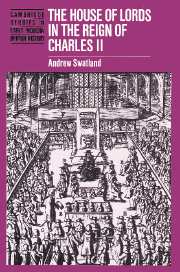Book contents
- Frontmatter
- Contents
- List of tables
- Acknowledgements
- List of abbreviations
- Note on the text
- 1 Introduction
- PART 1 FROM ABOLITION TO RESTORATION
- PART 2 MEMBERS AND THE BUSINESS OF THE HOUSE
- PART 3 KING, LORDS AND COMMONS
- PART 4 RELIGION
- 8 Religious composition
- 9 Church settlement
- 10 Religious nonconformity
- PART 5 POLITICS
- Appendix 1 Temporal members of the House of Lords
- Appendix 2 The bishops, 1661–1681
- Index
- Cambridge Studies in Early Modern British History
10 - Religious nonconformity
Published online by Cambridge University Press: 12 October 2009
- Frontmatter
- Contents
- List of tables
- Acknowledgements
- List of abbreviations
- Note on the text
- 1 Introduction
- PART 1 FROM ABOLITION TO RESTORATION
- PART 2 MEMBERS AND THE BUSINESS OF THE HOUSE
- PART 3 KING, LORDS AND COMMONS
- PART 4 RELIGION
- 8 Religious composition
- 9 Church settlement
- 10 Religious nonconformity
- PART 5 POLITICS
- Appendix 1 Temporal members of the House of Lords
- Appendix 2 The bishops, 1661–1681
- Index
- Cambridge Studies in Early Modern British History
Summary
The Act of Uniformity created a church that was more exclusive than either the king or many in his upper House desired. Ministers who refused to accept the conditions imposed by the Act were ejected from their living. Despite vociferous complaints in the Lords, further measures were enacted against nonconformists in an attempt to prevent them from worshipping freely. Initially the king employed legislation to lessen the severity of the church settlement in the hope that moderate dissenters might be enticed back into the established church. At the same time he sought to provide a limited toleration for those peaceable dissenters who would not conform, and on at least two occasions tried to accomplish this with his prerogative powers. The first part of this chapter is concerned with the Lords' involvement in these endeavours and its reaction to legislation against moderate dissenters especially during the 1660s. The second is concerned with the peers' changing attitude towards Catholics.
The first parliamentary assault on the church settlement occurred on 23 February 1663 when Lord Robartes introduced on behalf of the government a Bill of Indulgence in the Lords. This measure followed closely on the heels of the king's Declaration of Indulgence, which had been issued on 26 December. The Declaration had announced his intention of seeking parliament's approval to ‘exercise with more universal satisfaction that power of dispensing which we conceive to be inherent in us’, and also secure limited relief for loyal Catholics.
- Type
- Chapter
- Information
- The House of Lords in the Reign of Charles II , pp. 173 - 200Publisher: Cambridge University PressPrint publication year: 1996



